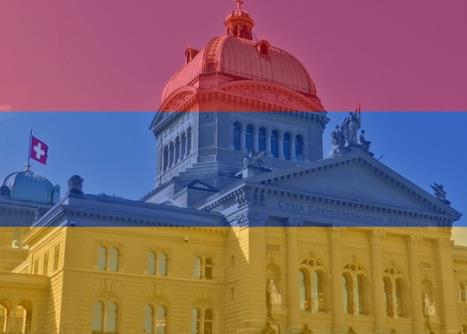
Swiss Parliament's Questionable Motions On Garabagh: From Neutrality To Bias?
Switzerland, renowned for its neutrality and diplomatic finesse over its longstanding history has found itself at an unexpected crossroads. It reaches a rather unexpected moment: the hearings in the parliament as a review of the role of Azerbaijan in Garabagh reveal greater geopolitical involvement; a question may be raised whether Switzerland began to deflect from its traditionally impartial course. The Hearings- their character was a condemnation of Azerbaijan and clear partiality to the interests of Armenia-reflected not only a preoccupation with politics but also a tug-of-war of the influences of lobbying and diplomatic balance.
Swiss Lawmakers' Motions: A Cloak for Armenian Lobby Interests
The parliamentary discussions in Bern took an unexpectedly sharp turn, with numerous Swiss lawmakers firmly proposing motions that resonate with long-standing Armenian narratives. These motions, which demand sanctions and advocate for international recognition of the Armenian separatist regime, clearly represent a significant departure from Switzerland's longstanding policy of non-interference.
Rather than a neutral assessment of Azerbaijan's recent operations, the debate skewed heavily toward portraying Baku as the aggressor. This selective outrage suggests that the hearings were more than mere oversight-they were a platform shaped by influence from the Armenian diaspora, which has a significant presence in Switzerland, a place where no one would have even guessed.
Swiss Parliament mirrors French and Belgian trends
This tilt toward pro-Armenian rhetoric is not an isolated case, and indeed Azerbaijan has become quite used to seeing this kind of behavior from several countries. Similar trends have surfaced across European legislatures, most notably in France and Belgium. In these countries, Armenian lobbying efforts have succeeded in steering political discourse, resulting in motions and resolutions critical of Azerbaijan. Most certainly this shift in behavior came right after Azerbaijan's rightful fight in Patriotic War. Where Azerbaijan has justifyingly regained its occupied territories. However, Switzerland's alignment with this pattern is quite troubling. By adopting a largely one-sided narrative, the country risks eroding the impartial stance that has allowed it to mediate conflicts effectively on the global stage.
This shift raises the question: Is Switzerland losing control of its parliamentary process to external lobbying interests?
The recognition of the "Armenian genocide" was hailed as a major diplomatic win by the Armenian diaspora. Yet, what has this recognition truly achieved? Armenia remains economically and diplomatically marginalized, with its borders with Azerbaijan and Türkiye closed for decades. The emotional and symbolic gains have not translated into strategic advantages or regional integration, leaving Armenia stuck in a cycle of dependency on Russia and struggling to diversify alliances. Similarly, Swiss recognition of Armenian separatist claims in Garabagh may only lead to further isolation.
Switzerland's engagement in anti-Azerbaijani rhetoric comes at a strategic cost. By adopting motions that antagonize Baku, Swiss lawmakers risk jeopardizing potential cooperation not only with Azerbaijan but also with Türkiye, a close ally of Azerbaijan. In addition, what once made Switzerland an ideal mediator-its non-alignment and diplomatic balance-now appears at risk as parliamentarians indulge in selective moral posturing. The lack of nuance in these debates and the over-reliance on diaspora-driven narratives diminish Switzerland's credibility as a trusted intermediary in international disputes.
Swiss recognition of Armenian narratives in Garabagh would likely have similar outcomes-empty symbolic victories with little real-world impact. Armenia risks further isolation by clinging to divisive rhetoric, while Switzerland risks damaging its reputation as a neutral mediator. Meanwhile, Azerbaijan remains committed to reintegration, offering a pragmatic path forward for Armenian residents in the region. Ultimately, Switzerland and other European states must decide whether symbolic recognition is worth the diplomatic cost. Will it help Armenia escape its isolation, or will it deepen the divides in an already fragile region? As the Azerbaijani government has stressed repeatedly:“Our door is open for reintegration. Now the choice is up to them.”
The Garabagh hearings in Switzerland's parliament offer a revealing glimpse into how lobbying efforts and selective outrage can derail even the most established diplomatic traditions. If Switzerland continues down this path, it risks more than just diplomatic fallout-it risks compromising its identity as a neutral arbiter in global conflicts. With regional powers like Azerbaijan and Türkiye closely watching, Switzerland must recalibrate its stance before the consequences become irreversible. Though as much as we try to understand that, this anti-Azerbaijani behavior is nothing but an act of show by certain MPs, these developments may have lasting diplomatic consequences for Swiss-Azerbaijani relations and limit Switzerland's effectiveness as a neutral partner in future peace efforts!
Legal Disclaimer:
MENAFN provides the
information “as is” without warranty of any kind. We do not accept
any responsibility or liability for the accuracy, content, images,
videos, licenses, completeness, legality, or reliability of the information
contained in this article. If you have any complaints or copyright
issues related to this article, kindly contact the provider above.


















Comments
No comment